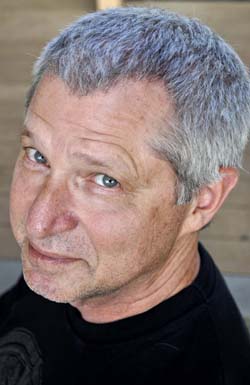O. Henry winner Steve Heller at next Authors Series

O. Henry Award-winning author Steve Heller spent much of his early professional life avoiding what he wanted to do most — write. Heller, who is the next author in Eduardo Santiago’s Idyllwild Authors Series, said he knew from the age of 15 that he wanted to be a writer. But even knowing that writing was his passion, Heller said he still delayed submitting his first story for many years.
“For 10 years I’d do everything but write,” said Heller. “I’d outline, go on writing retreats, everything. I was terrified of failing at it,” said Heller, who now chairs the creative writing master in fine arts program at Antioch University, Los Angeles.
Once out of high school, Heller pursued an undergraduate degree in English and graduate degrees in English education, including a doctorate. He said he realized that if he were to teach as part of his career path, he wanted to teach creative writing. He then acquired an master in fine arts in creative writing. “It was a way to avoid growing up,” said Heller of his extended years of education and delay in writing creatively.
His published story, “The Red Dust of Lana’i,” appeared in 1987 in a collection of short stories, “Passages to the Dream Shore: Short Stories of Contemporary Hawaii,” compiled by Frank Stewart. Heller noted that the impetus for his first story was a desire to preserve a personal memory from an earlier time spent in Hawaii — of people who worked in the pineapple fields on Lana’i, their pidgin English, and a way of life that Heller saw disappearing.
“Memory and imagination are the two resources of fiction,” said Heller. “And it was the memory of those voices I was trying to retain and preserve that allowed me to start. Once I had that, the writing went well.”
The red dust, dislodged by heavy trucks transporting pineapple on Lana’i’s unpaved roads, was also part of a rapidly disappearing past, as Lana’i’s pineapple agriculture attenuated, roads became paved, and resorts began to open. “I wrote this because the voices of these characters were disappearing in my memory,” said Heller. “I thought ‘how would it be like for this way of life to be disappearing’ and that is why and how I began.
“No matter what else we think we’re doing [as writers], we’re always writing about history. I’m also the kind of writer who likes to move through topography and landscapes.” Heller said remembered sounds and landscapes impel his writing.
“I don’t believe in plot,” he said. “I believe in voice and point of view.” Of his approach to writing, Heller said that images, details of place, phrasings that repeat over and over, patterns that readers see and recognize, are what characterize and color his writing.
As to structure, Heller said he starts with the first line and then considers what the character needs to know and what the next words would be. In a story from his collection “The Man Who Drank a Thousand Beers,” the first line is, “Joseph Kamahele, the strongest man in Waikiki, was sure he was being watched.”
“So, who is watching him and what are they trying to see or detect, would be where I would go next,” Heller said.
Heller, who said he advises his students to pursue careers in writing only if they have to, said he is compelled to write. “Writing is not self-expression [a mistaken belief he points out to his students],” he said. “It is engagement with ‘otherness,’ putting oneself in another’s shoes until those feelings become comfortable and natural.” And for Heller it is the interweaving of memory and imagination that produces, as his stories unfold, that natural comfort.
Heller’s writing has earned a National Endowment for the Arts Fellowship, two O. Henry short story awards, a Kansas Literary Artists Fellowship in fiction and a Kansas Governor’s Arts Award. Critics have called his “Thousand Beers” collection of stories, all set in Hawaii, “a Hawaiian ‘Winesburg, Ohio.’”
He will discuss with Santiago his award-winning novel “The Automotive History of Lucky Kellerman” (Chelsea Green, 1987). “Kellerman” received a Friends of American Writers First Prize Award for the best book of fiction or nonfiction related to the Midwest. It is inspired by his relationship with his father, a man who worked with his hands. Heller said he knew from an early age he would be a different kind of man, one who worked using his mind. But it was the question of how he could be so different from his father, and that they nevertheless loved each other, that led him to write “Kellerman.” “What if we had been less forgiving, less patient, slightly different sorts of people,” he wondered. “What if one of us had made a serious mistake, something the other could not have forgiven.” Heller said the answers to these questions led to a story that grew into his novel. He is currently working on his next novel, “Return of the Ghost Killer,” another work that examines father, son relationships. “That’s an important theme in my work,” said Heller.
He and Santiago talk at 2 p.m. on Sunday, July 15, at INK Book Gathering on North Circle. The event is free.





